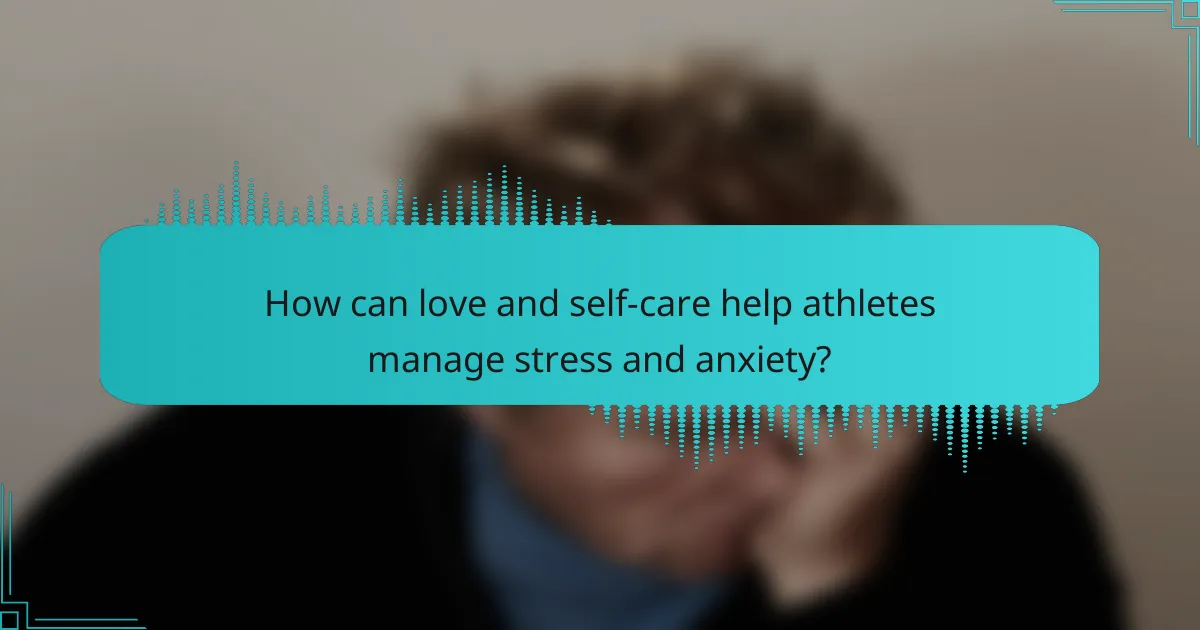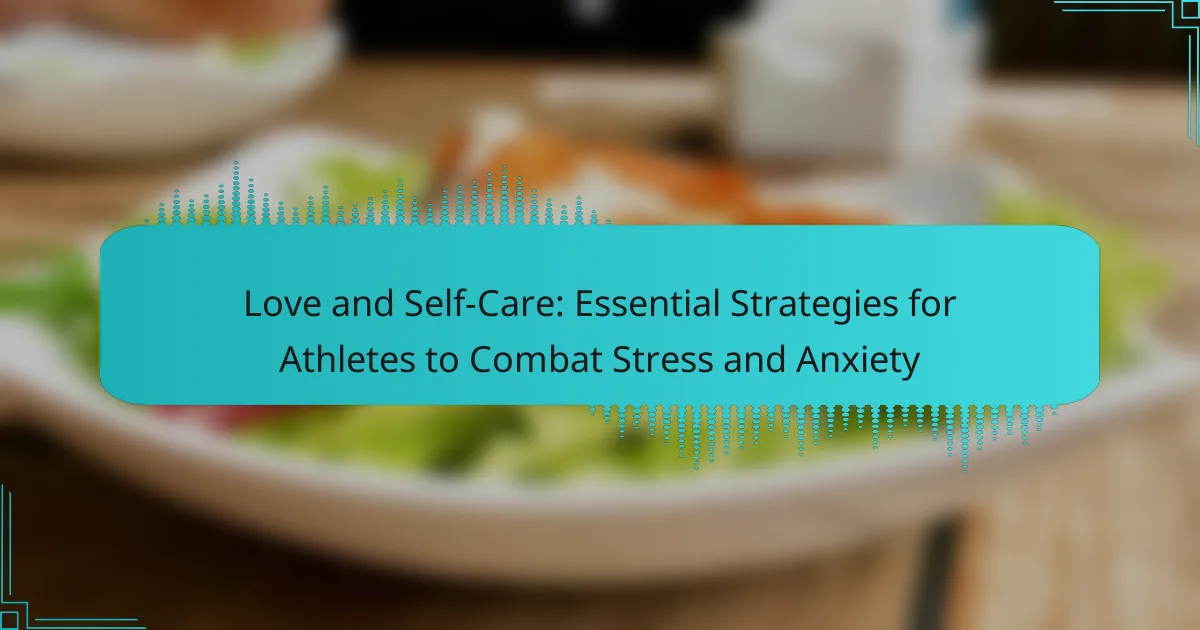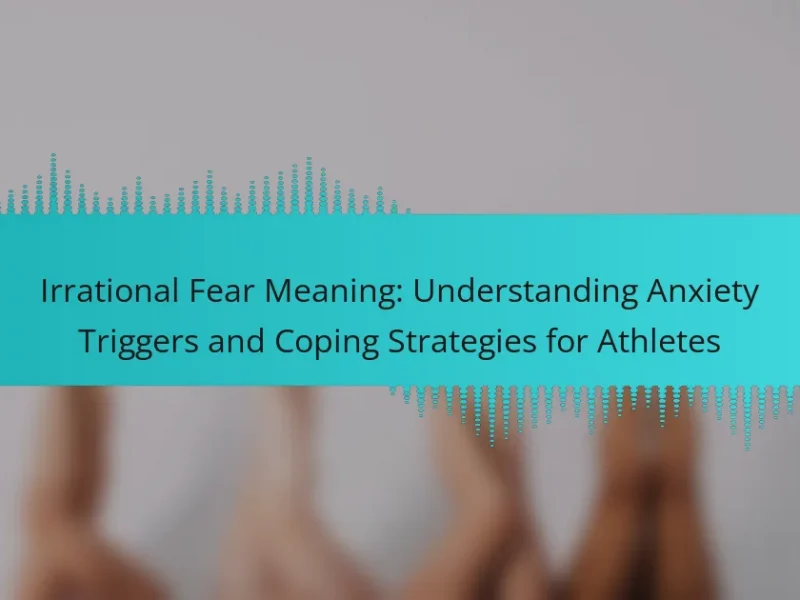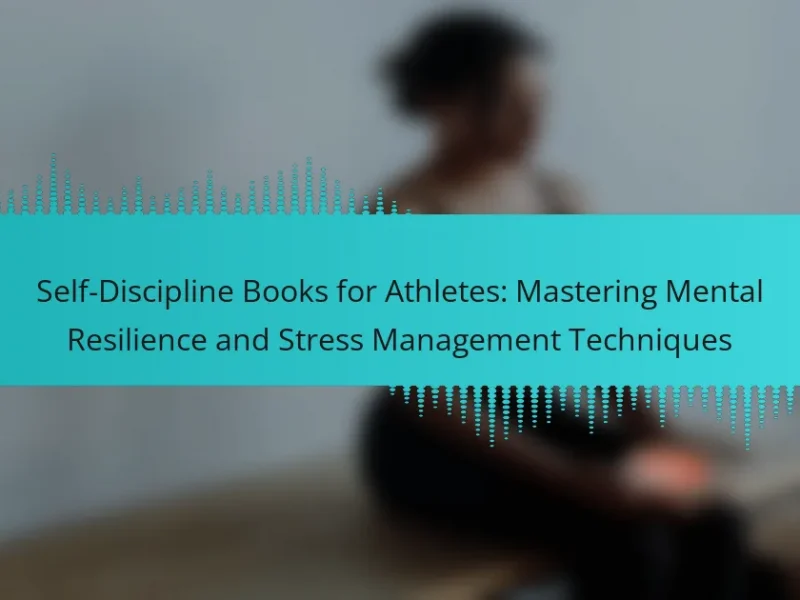Athletes often face high levels of stress and anxiety, impacting performance and well-being. Love and self-care strategies can enhance emotional resilience, foster support systems, and promote mental well-being. Mindfulness and adequate rest are vital self-care practices that empower athletes to recharge. Engaging in these strategies leads to improved performance and a balanced approach to competition and life.

How can love and self-care help athletes manage stress and anxiety?
Love and self-care significantly help athletes manage stress and anxiety by fostering emotional resilience and promoting mental well-being. Love creates a support system, enhancing motivation and reducing feelings of isolation. Self-care practices, such as mindfulness and adequate rest, empower athletes to recharge mentally and physically. Research indicates that athletes who engage in self-care report lower stress levels and improved performance. Incorporating these strategies leads to a more balanced approach to competition and life, ultimately enhancing overall athletic experience.
What are the psychological benefits of self-care for athletes?
Self-care significantly enhances athletes’ mental health by reducing stress and anxiety. Engaging in self-care practices fosters resilience, improves focus, and enhances overall performance. Regularly prioritising self-care can lead to increased emotional stability and better coping mechanisms. Athletes who implement self-care strategies report higher levels of motivation and satisfaction in their training and competition.
How does self-love influence athletic performance?
Self-love significantly enhances athletic performance by fostering mental resilience and reducing stress. Athletes who practice self-love experience improved focus and motivation, leading to better training outcomes. Research indicates that self-compassion correlates with lower anxiety levels, promoting a positive mindset essential for peak performance. Furthermore, athletes who engage in self-care routines report higher satisfaction and commitment to their sport, translating into consistent practice and improved results.
What are effective self-affirmation techniques for athletes?
Effective self-affirmation techniques for athletes include positive self-talk, visualization, and gratitude practices. These methods enhance mental resilience and reduce stress.
Positive self-talk involves repeating affirmations that reinforce self-belief and confidence. Visualization allows athletes to mentally rehearse successful performances, creating a sense of familiarity and comfort. Gratitude practices help shift focus from stressors to positive experiences, fostering a supportive mindset.
Incorporating these techniques regularly can lead to improved performance and overall well-being.
What role does emotional support play in coping with stress?
Emotional support significantly enhances athletes’ ability to cope with stress. It fosters resilience by providing a safety net during challenging times. Supportive relationships facilitate open communication, allowing athletes to express feelings and concerns, which alleviates anxiety. Research shows that athletes with strong emotional support systems report lower stress levels and higher performance. This support can come from coaches, teammates, family, or friends, creating a positive environment that nurtures mental well-being. Ultimately, emotional support acts as a unique attribute in an athlete’s toolkit for managing stress effectively.
What are universal self-care strategies for athletes?
Athletes can effectively combat stress and anxiety through universal self-care strategies such as mindfulness, adequate sleep, balanced nutrition, and social support. Mindfulness practices, like meditation, enhance focus and reduce anxiety. Prioritising sleep improves recovery and mental clarity. A balanced diet provides essential nutrients for both physical and mental health. Lastly, maintaining strong social connections fosters emotional resilience.
How can athletes incorporate relaxation techniques into their routine?
Athletes can effectively incorporate relaxation techniques into their routine by practicing mindfulness, deep breathing, and progressive muscle relaxation. These strategies help reduce stress and anxiety, enhancing performance. Mindfulness meditation, for example, improves focus and emotional regulation. Deep breathing exercises can be done before competitions to calm nerves. Progressive muscle relaxation promotes physical and mental recovery, aiding in overall well-being. Regular practice of these techniques fosters a balanced approach to training and competition.
What are the benefits of physical activity on mental health?
Physical activity significantly enhances mental health by reducing stress and anxiety. Regular exercise releases endorphins, which improve mood and promote feelings of well-being. Studies show that even moderate physical activity can decrease symptoms of depression and anxiety. Additionally, engaging in sports fosters social connections, providing emotional support and reducing feelings of isolation. Athletes often report improved self-esteem and resilience, further contributing to mental health benefits.
What unique practices can enhance self-care for athletes?
Engaging in unique practices can significantly enhance self-care for athletes. Techniques such as mindfulness meditation, which improves focus and reduces anxiety, are particularly effective. Incorporating creative outlets like art or music can also provide emotional relief. Additionally, establishing a gratitude routine fosters a positive mindset, promoting overall well-being. Lastly, nature immersion through activities like hiking or gardening can rejuvenate an athlete’s mental state.
How can journaling improve an athlete’s mental well-being?
Journaling can significantly enhance an athlete’s mental well-being by promoting self-reflection and emotional processing. It allows athletes to articulate their thoughts, reducing stress and anxiety. Regular journaling fosters mindfulness, helping athletes stay present and focused. Studies show that expressive writing can lead to improved mood and decreased levels of anxiety. Additionally, journaling provides a unique attribute of tracking progress and setting goals, which can enhance motivation and performance.
What are the advantages of visualization techniques for performance anxiety?
Visualization techniques significantly reduce performance anxiety by enhancing focus and building confidence. These methods allow athletes to mentally rehearse their performance, leading to improved emotional regulation. By visualising successful outcomes, athletes can create a positive mindset, which directly impacts their physical performance. Studies indicate that visualization can decrease anxiety levels, making it a valuable tool in sports psychology.
What rare but effective self-care methods can athletes explore?
Athletes can explore rare but effective self-care methods such as forest bathing, breathwork, and sound healing. Forest bathing involves immersing oneself in nature to reduce stress and enhance mood. Breathwork techniques promote relaxation and mental clarity, aiding in recovery. Sound healing utilises vibrations from instruments to alleviate anxiety and improve focus. Each method uniquely contributes to emotional well-being, providing athletes with alternative strategies to combat stress.
How can art therapy benefit athletes dealing with stress?
Art therapy can significantly benefit athletes dealing with stress by promoting emotional expression and enhancing mental resilience. It provides a creative outlet that helps athletes process their feelings, reducing anxiety and improving overall well-being. Engaging in art therapy fosters mindfulness, allowing athletes to focus on the present moment, which can alleviate performance pressure. Studies show that creative activities can lower cortisol levels, contributing to stress relief. Additionally, art therapy encourages self-reflection, helping athletes identify triggers and develop coping strategies. This holistic approach supports both mental and emotional health, essential for peak performance in sports.
What innovative approaches are being used in sports psychology?
Innovative approaches in sports psychology focus on enhancing athletes’ mental resilience through mindfulness and cognitive-behavioral techniques. These strategies help manage stress and anxiety, promoting self-care and emotional well-being. Techniques like visualization and biofeedback are gaining traction, allowing athletes to gain greater control over their mental states. Additionally, integrating technology, such as apps for mental training, provides personalised support for athletes in real-time.
What common mistakes do athletes make in their self-care routines?
Athletes often make crucial mistakes in their self-care routines that can lead to increased stress and anxiety. Common errors include neglecting rest and recovery, failing to maintain a balanced diet, and overlooking mental health practices. Many athletes prioritise training over adequate sleep, which is essential for physical and mental recovery. Additionally, they may consume diets high in processed foods, lacking necessary nutrients for optimal performance. Lastly, ignoring mental health strategies, such as mindfulness or relaxation techniques, can exacerbate stress levels, impacting overall well-being.
What are best practices for integrating self-care into daily training?
Integrating self-care into daily training involves establishing routines that prioritise mental and physical well-being. Key practices include setting aside time for mindfulness, incorporating rest days, and maintaining a balanced diet.
Mindfulness techniques, such as meditation or deep breathing, can reduce stress and enhance focus. Scheduling regular rest days allows for recovery, preventing burnout and injuries. A balanced diet supports overall health and energy levels, crucial for optimal performance.
Additionally, tracking emotional states can help athletes identify stressors and adjust their routines accordingly. Engaging in enjoyable activities outside of training fosters a positive mindset and enhances motivation.
How can athletes develop a personalized self-care plan?
Athletes can develop a personalised self-care plan by assessing their unique needs and preferences. Begin by identifying stressors and anxiety triggers, then select self-care strategies that resonate personally. Incorporate techniques such as mindfulness, physical activity, and adequate rest, ensuring they align with individual schedules and goals. Regularly evaluate and adjust the plan based on effectiveness and changing circumstances.
What expert insights can help athletes optimize their mental health strategies?
Athletes can enhance their mental health strategies by prioritising love and self-care. Incorporating mindfulness practices, setting boundaries, and fostering supportive relationships significantly reduce stress and anxiety. Research shows that athletes who engage in self-compassion report higher well-being levels. Regularly practising gratitude also contributes to a positive mindset, improving performance and resilience.


